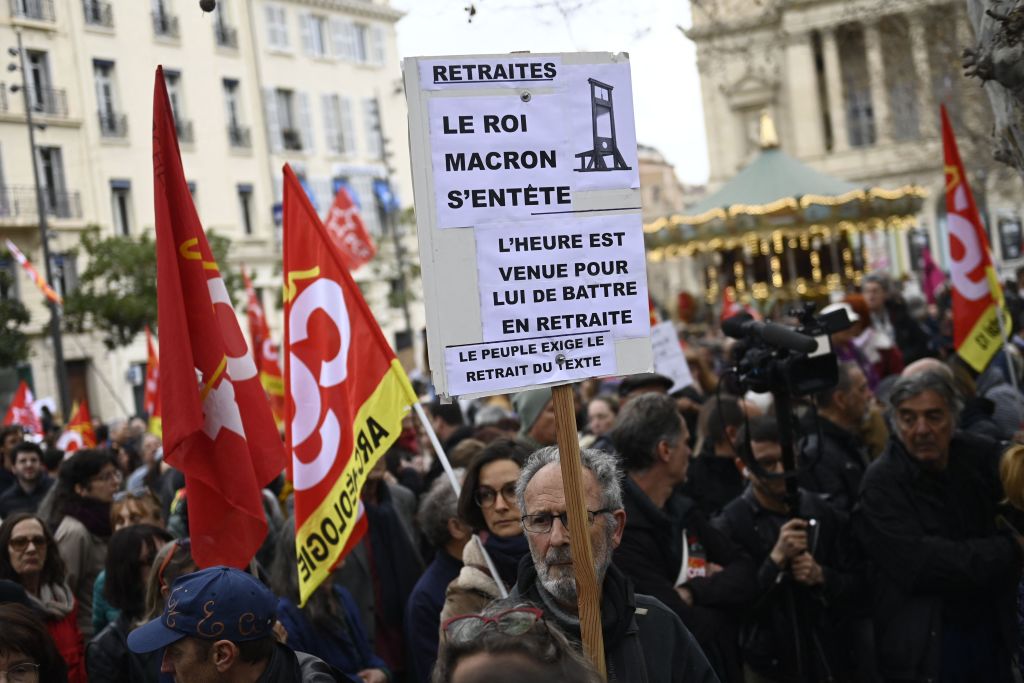Is France 'on the edge of civil unrest'?
Protests have erupted in response to Emmanuel Macron's decision to unilaterally raise the retirement age


A free daily email with the biggest news stories of the day – and the best features from TheWeek.com
You are now subscribed
Your newsletter sign-up was successful
French Prime Minister Élisabeth Borne announced last week that President Emmanuel Macron's government would use a constitutional maneuver, Article 49.3, to push through controversial and deeply unpopular changes to France's retirement system without a full vote in Parliament. Macron's decision to unilaterally raise the retirement age to 64, from 62, among other changes, has sparked large, sometimes violent protests and enduring strikes by garbage workers, teachers, train drivers, and other labor unions.
Olivier Faure, the leader of France's center-left Socialist Party, accused Macron of deploying a "permanent coup d'état" to shove through the legislation, and far-right National Rally leader Marine Le Pen called the government's use of Article 49.3 "an extraordinary confession of weakness." But Macron and his government insist the reforms are needed to keep the pension system solvent and government borrowing acceptably low. "We cannot gamble on the future of our pensions," Borne told jeering lawmakers in the National Assembly, the lower house of Parliament. "The reform is necessary."
The government narrowly survived a series of no-confidence votes Monday, but "the country teeters on the edge of civil unrest," writes BBC News. Police are gearing up for "unpredictable, spontaneous protests in cities and small towns across France," The Guardian reports. A national day of strike action on Thursday could grind the country to a halt, garbage is piling up in Paris as trash collectors protest the changes, and at least two oil refineries could be shut down, The Associated Press reports.
The Week
Escape your echo chamber. Get the facts behind the news, plus analysis from multiple perspectives.

Sign up for The Week's Free Newsletters
From our morning news briefing to a weekly Good News Newsletter, get the best of The Week delivered directly to your inbox.
From our morning news briefing to a weekly Good News Newsletter, get the best of The Week delivered directly to your inbox.
What are the commentators saying?
The "cold reality" is that "Macron's modest pension reform" is necessary because France's "pay-as-you-go pension system is unsustainable," The Wall Street Journal said in an editorial. "The retirement age is 62, one of the youngest in Europe," and "the worker-to-retiree ratio has shrunk to 1.7 to 1 from 3 to 1 in 1970." Macron's decision to use Article 49.3 "will incense opponents," the Journal says, but he deserves "credit for persistence — and political brass" — for tackling head-on a problem that haunts all "welfare-state democracies" with "unaffordable but politically entrenched" entitlements.
The case for Macron's pension overhaul is "strong," but he "scarcely laid the groundwork" even though "he knew well that it would touch a deep French nerve at a time of economic hardship," Roger Cohen writes in The New York Times. "His push for later retirement was top-down, expedited at every turn and, in the end, ruthless." Macron "may see his decision as necessary to cement his legacy as the leader who left France prepared to face the rest of the 21st century," but his success in shoving it through "now looks like a Pyrrhic victory," and he will "walk a lonely road" in his final term "with 'Mr. 49.3' stamped on his forehead."
The overwhelming opposition to Macron's reform actually highlights France's deep polarization and fragile democracy, Hugh Schofield writes at BBC News. "Many protesters are calling not just for an end to the reform, but actually for a lowering of the retirement age, back to where it was before 2010, when it was just 60," but the far-right argues that "the Macron plan is already so riddled with concessions and exemptions" that any savings "are now virtually meaningless."
What's next for France and Macron?
"Opponents of pension reform still have cards to play," Romain Houeix reports at France 24. Some lawmakers, especially with the leftist NUPES coalition, say they may launch a type of referendum called a référendum d'initiative partagée (RIP) that would force a public vote on the pension reforms if 185 legislators and 4.87 million French voters sign on within nine months. And critics of the legislation say they will also file a challenge before the Constitutional Council, arguing that the pension reform is unconstitutional.
A free daily email with the biggest news stories of the day – and the best features from TheWeek.com
Meanwhile, Macron is "paying a high price" for his reforms, Politico says: In one survey, 70 percent of respondents said they were dissatisfied with him, and "dissatisfaction with Macron crosses all categories, the younger generations as well as the blue- and white-collar workers."
"The French attitude to a mighty presidency is notoriously ambiguous," Cohen writes in the Times. "On the one hand, the near-monarchical office seems to satisfy some French yearning for an all-powerful state — it was a French king, Louis XIV, who is said to have declared that the state was none other than himself. On the other, the presidency is resented for the extent of its authority." As for Macron, Cohen adds, it's clear he "has proved no more impervious to the temptations of the presidency than his predecessors."
Updated March 21, 2023: This article has been updated to reflect new developments.
Peter has worked as a news and culture writer and editor at The Week since the site's launch in 2008. He covers politics, world affairs, religion and cultural currents. His journalism career began as a copy editor at a financial newswire and has included editorial positions at The New York Times Magazine, Facts on File, and Oregon State University.
-
 How the FCC’s ‘equal time’ rule works
How the FCC’s ‘equal time’ rule worksIn the Spotlight The law is at the heart of the Colbert-CBS conflict
-
 What is the endgame in the DHS shutdown?
What is the endgame in the DHS shutdown?Today’s Big Question Democrats want to rein in ICE’s immigration crackdown
-
 ‘Poor time management isn’t just an inconvenience’
‘Poor time management isn’t just an inconvenience’Instant Opinion Opinion, comment and editorials of the day
-
 Bizarre pizza toppings horrify Italians
Bizarre pizza toppings horrify ItaliansTall Tales And other stories from the stranger side of life
-
 Despairing husband creates 'Taylor Swift jar'
Despairing husband creates 'Taylor Swift jar'Tall Tales And other stories from the stranger side of life
-
 Why a bale of straw is hanging from a London bridge
Why a bale of straw is hanging from a London bridgeTall Tales And other stories from the stranger side of life
-
 How the world reported French riots over shooting of teenage boy
How the world reported French riots over shooting of teenage boyfeature Violence has ripped through French suburbs in days following death of Nahel M.
-
 Heatwaves prompt snake escapes
Heatwaves prompt snake escapesfeature And other stories from the stranger side of life
-
 French politician under fire for appearing on Playboy magazine cover
French politician under fire for appearing on Playboy magazine coverSpeed Read
-
 French minister sparks anger with Playboy cover
French minister sparks anger with Playboy coverSpeed Read Marlène Schiappa gave interview on women’s and LGBTQ+ rights – photographed fully clothed in white dress
-
 France after Macron: can anything stop Marine Le Pen?
France after Macron: can anything stop Marine Le Pen?Today's Big Question Analysts believe the far-right leader may be the biggest political beneficiary of popular fury over President Macron’s pension reforms
